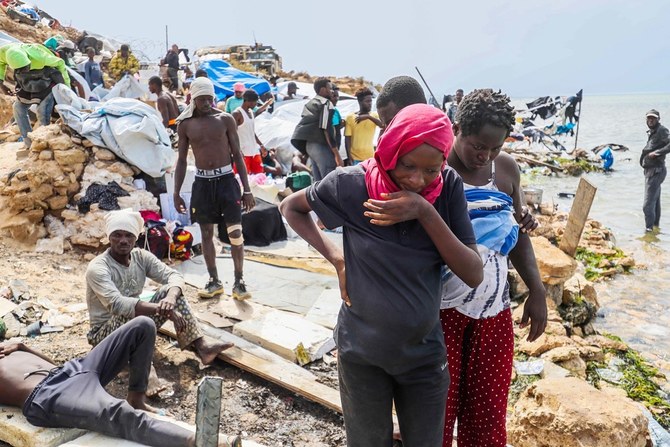TUNIS: Almost 800 irregular migrants drowned off Tunisia in the first half of this year as they tried to reach Europe by boat, a National Guard spokesman said on Thursday.
“789 bodies of migrants were recovered from the sea, including 102 Tunisians, the others foreigners and unidentified people,” said Houcem Eddine Jebabli, adding that more than 34,000 were rescued.
The North African country has become a major gateway for irregular migrants and asylum-seekers attempting the perilous sea voyage in often rickety boats in the hope of a better life in Europe.
The distance between Tunisia, near its second city of Sfax, and the Italian island of Lampedusa is about 130 km, and the sea voyages pick up in the summer months.
Between Jan. 1 and June 20, a total of 34,290 migrants were intercepted and rescued, sharply up from 9,217 over the same period of last year, Jebabli said.
More than 30,000 of those rescued this year were foreigners, mostly from sub-Saharan Africa, he said.
Coast Guard units carried out 1,310 operations in the first six months, more than double the number of missions for that period last year.
FASTFACT
Between Jan. 1 and June 20, a total of 34,290 migrants were intercepted and rescued, sharply up from 9,217 over the same period of last year.
The Italian government says that more than 80,000 people have crossed the Mediterranean Sea to arrive on its shores so far this year, mostly from Tunisia and from war-scarred Libya.
The central Mediterranean has become the world’s deadliest migratory route, claiming more than 20,000 lives since 2014, according to the International Organization for Migration.
As Tunisia has become a growing hub on the migrant route, racial tensions and violence have flared in the country of 12 million which is struggling with a deep economic crisis.
High inflation and growing unemployment have seen many Tunisians too try to flee their country.
Xenophobic attacks have repeatedly targeted black African migrants and students, fueled by incendiary rhetoric from President Kais Saied.
Saied has alleged that “hordes” of sub-Saharan migrants were causing crime and posing a demographic threat to the mainly Arab country.
Earlier this month, as Sfax was rocked by racial violence, authorities loaded many migrants onto buses and left them stranded in remote desert areas near Algeria and Libya in searing summer heat.
Human Rights Watch said up to 1,200 black Africans were “expelled or forcibly transferred by Tunisian security forces” to the border regions with Libya and Algeria this month.
The Tunisian Red Crescent, and Libyan border guards, have reported helping migrants left without water and food in heat that has topped 40 degrees Celsius (104 Fahrenheit).
The European Union has recently been in talks with his government, offering Tunisia a major funding package to help it revive its flagging and debt-hit economy, and better secure its borders.



























